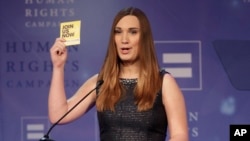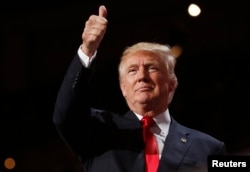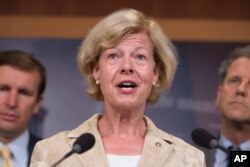Americans will see the first openly transgender person address a national convention of either major political party when activist Sarah McBride takes the stage Thursday ahead of Democratic presidential nominee Hillary Clinton.
“I’m honored for this opportunity to share my story,” McBride, a spokeswoman for the Washington-based Human Rights Campaign, said in a statement on the organization’s website.
“People must understand that even as we face daily harassment, tragic violence and an onslaught of anti-LGBTQ (lesbian, gay, bisexual, transgender, queer or questioning) political attacks across the country, we are real people merely seeking to be treated with the dignity and respect every person deserves,” she added.
But McBride’s convention speech in Philadelphia won't be the only milestone for the LGBT community in this year’s election cycle.
Last week, Donald Trump became the first Republican presidential nominee to speak inclusively of sexual minorities in his acceptance speech before thousands of party delegates more accustomed to hearing denunciations of gays and lesbians.
Pledge of protection
Noting last month’s Islamic State-inspired mass shooting at a gay nightclub in Orlando, Florida, Trump pledged “to protect our LGBTQ citizens from the violence and oppression of a hateful foreign ideology.”
Trump paused as applause and chants of approval filled the convention hall in Cleveland.
“And I have to say, as a Republican, it is so nice to hear you cheering for what I just said,” the Republican nominee added.
“It was most definitely a historic moment,” said Gregory Angelo, president of Log Cabin Republicans, an organization of gay conservatives. “And it was certainly something that was exceptionally encouraging to me, personally.”
Angelo and other Log Cabin officials attended the convention and witnessed Trump’s speech. He said the entire group took note of a marked difference in tone and substance from previous Republican gatherings.
“They [gay Republicans] have been through some of the darker days. They have seen the Republican Party that not only didn’t even mention the LGBTQ community, but had been overtly hostile to this community,” Angelo added. “Hopefully, this convention might mark a turning point where we are no longer mired in these eternal culture wars over this issue.”
Others had a different take on Trump’s remarks.
“It was simply verbal window-dressing for a transparently anti-LGBTQ agenda,” said Victoria Kirby York, campaign director for the National LGBTQ Task Force Action Fund.
Unfriendly platform
Kirby York noted that Trump’s vice presidential pick, Indiana Governor Mike Pence, last year signed a state law protecting those who discriminate against sexual minorities based on religious convictions. She also argued that the Republican Party platform approved at the convention is anything but gay-friendly.
“The platform endorses so-called conversion therapy [attempts to make gays and lesbians heterosexual],” Kirby York said. “It calls for a ban on same-sex marriage and bans transgender people from using restrooms that match their gender identity.”
“He (Trump) mentioned us, but it’s no revelation to America that we exist,” she added.
“Mike Pence certainly wasn’t my first choice for vice president,” Angelo conceded, adding that Log Cabin Republicans themselves denounced “the most anti-LGBT platform in the Republican Party’s 162-year history.”
“[But] the convention was the most pro-LGBT convention the Republican Party has had in its history,” Angelo added. “The platform is a symbolic document. There’s an importance to that symbolism, but I’m more interested to see actions rather than words on a page.”
The subject of sexual orientation was first broached at a major party convention in 1972, when a lesbian spoke to Democratic delegates who had gathered to nominate George McGovern for president. The speaking slot came in the morning, not prime time, and did not lead to declarations of support for gay rights in the Democratic platform that year.
Many more voices
By contrast, this week’s Democratic National Convention is studded with LGBT speakers, like McBride, Wisconsin Senator Tammy Baldwin and retired gay professional basketball player Jason Collins. Even among heterosexuals who spoke on the convention’s first night, a significant proportion declared support for sexual minorities.
“We urge both [political] parties to make LGBT freedom, justice and equality a top priority,” said Kirby York. “It would be a dream come true to have that happen.”
Researchers say about 3.8 percent of Americans identify as lesbian, gay, bisexual or transgender. Although a tiny faction of the country, Angelo argues the Republican Party would be wise to be more welcoming to sexual minorities as a signal to the broader electorate, which is increasingly supportive of gay rights.
“It’s more than just how many people identify as LGBT. It’s straight (heterosexual) allies and people who look at LGBT issues as something of a cultural litmus test,” Angelo said. “There is an opportunity for Republicans [to broaden the party’s appeal], and it might have taken someone like Donald Trump to drag the party, kicking and screaming in some cases, to get to that point at the convention.”






